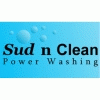- 0
Sign in to follow this
Followers
0

Thompson's Water Seal Vs. Ready Seal or other oil/paraffin based sealer
Asked by
Sud n Clean

Asked by
Sud n Clean
Talking to a potential customer who just recently installed a pressure treated pine fence. Asked him his idea about a finish. Said he was really thinking of Thompson's Water Seal.
I'd like a little feedback from you folks with mucho experience... I understand that Thompson's is NOT a good product. Those who have encountered Thompson's, is this true? I need talking points/facts to speak to him intelligently.
Been using Ready Seal since I stained my first deck in 2010. Never been disappointed. But, never spoke with someone who really wanted Thompson's, either.
Thanks in advance for your input.
Edited by Sud n CleanShare this post
Link to post
Share on other sites